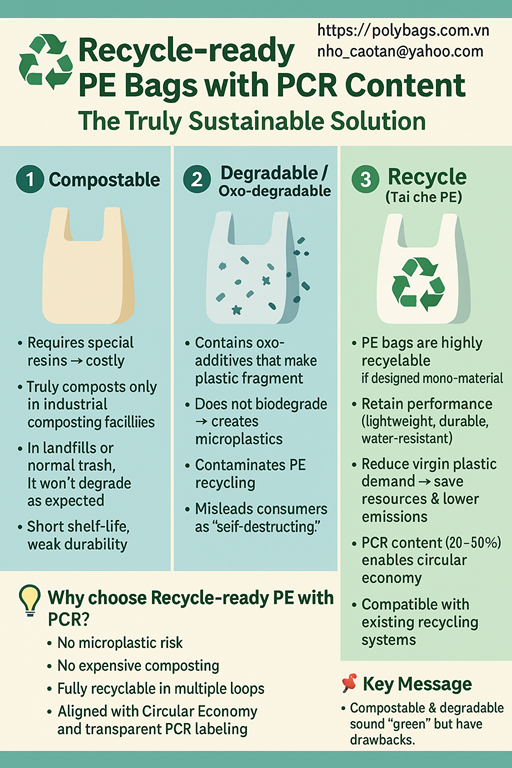-
-
-
Total:
-
NEWS

20
Month 09
By: Cao Tấn Nho
Recycle-ready PE bags + PCR content
🌱 Recycle-ready PE Bags – The Truly Sustainable Solution 1. Compostable Requires special r...
🌱 Recycle-ready PE Bags – The Truly Sustainable Solution
1. Compostable
-
Requires special resins (PLA/PBAT) → costly.
-
Truly composts only in industrial composting facilities (specific temperature, humidity, and microbes).
-
In landfills or mixed waste streams → does not degrade as advertised.
-
Short shelf-life, weak durability, easily torn.
2. Degradable / Oxo-degradable
-
Uses oxo-additives that cause plastic to fragment under sunlight or heat.
-
Does not biodegrade → generates microplastics.
-
Contaminates PE recycling streams.
-
Misleads consumers with claims of being “self-destructing.”
3. Recycle (PE Recycling) ✅
-
PE bags (HDPE/LDPE) are easily recyclable through mechanical recycling if designed as mono-material.
-
Retain full performance: lightweight, durable, water-resistant.
-
Reduce virgin plastic demand → save resources and lower emissions.
-
Can incorporate 20–50% PCR (post-consumer recycled) content to close the loop.
-
Compatible with existing recycling infrastructure, even in developing countries.
💡 Why Choose Recycle-ready PE Bags with PCR?
-
No microplastic risk (unlike degradable).
-
No costly industrial composting (unlike compostable).
-
Can be collected, recycled, and reused multiple times.
-
Fully aligned with the Circular Economy and transparent PCR labeling.
📌 Key Message
👉 Compostable and degradable bags only sound “green” but come with hidden drawbacks.
👉 Recycle-ready PE with PCR is the truly practical, economical, and sustainable path.

